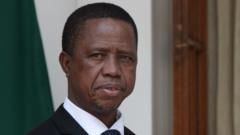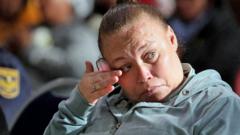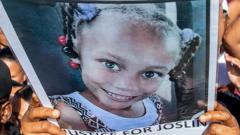The appointment of Pope Leo XIV has sparked reflections on identity and representation among Catholics worldwide, particularly those with African and Caribbean heritage.
Pope Leo XIV: A Symbol of Diversity in the Catholic Church

Pope Leo XIV: A Symbol of Diversity in the Catholic Church
The election of the first American-born pope, Leo XIV, brings new cultural resonance to global Catholicism.
Pope Leo XIV, recently appointed as the new head of the Catholic Church, has emerged as a figure of excitement and pride for many Catholics, particularly those descended from Afro-Caribbean roots. The Rev. Lawrence Ndlovu from Johannesburg highlighted the significance of Leo's racial identity during his emergence from St. Peter's Basilica, noting the departure from the traditionally "classical white" papal visage.
This revelation of Pope Leo's ties to Creole ancestry in New Orleans suggests a shared heritage that resonates with numerous Catholics of color, as they see in him an embodiment of their own struggles and aspirations. Comments from Father Ndlovu reflect this sentiment: "He’s not foreign to us. There is a part of him that is also us.”
The historical context of Leo's ancestry is still being uncovered. His maternal grandfather’s lineage is tied to multiple regions, with records indicating possible origins from the Dominican Republic, Haiti, and Louisiana. The legacy of his ancestors from New Orleans, particularly the Seventh Ward—which is known for its cultural amalgamation—further cements his position as a representative figure for marginalized communities.
Experts such as Edwin Espinal Hernández, a genealogist in the Dominican Republic, have been investigating the Pope's roots, highlighting the intricate histories that connect his familial background to significant cultural nodes across the Caribbean. Leo XIV's papacy not only signifies a shift in the demographics of church leadership but also opens doors to discussions on race, ancestry, and global Catholic identity, affirming the Church’s commitment to engaging with diverse communities worldwide.
This revelation of Pope Leo's ties to Creole ancestry in New Orleans suggests a shared heritage that resonates with numerous Catholics of color, as they see in him an embodiment of their own struggles and aspirations. Comments from Father Ndlovu reflect this sentiment: "He’s not foreign to us. There is a part of him that is also us.”
The historical context of Leo's ancestry is still being uncovered. His maternal grandfather’s lineage is tied to multiple regions, with records indicating possible origins from the Dominican Republic, Haiti, and Louisiana. The legacy of his ancestors from New Orleans, particularly the Seventh Ward—which is known for its cultural amalgamation—further cements his position as a representative figure for marginalized communities.
Experts such as Edwin Espinal Hernández, a genealogist in the Dominican Republic, have been investigating the Pope's roots, highlighting the intricate histories that connect his familial background to significant cultural nodes across the Caribbean. Leo XIV's papacy not only signifies a shift in the demographics of church leadership but also opens doors to discussions on race, ancestry, and global Catholic identity, affirming the Church’s commitment to engaging with diverse communities worldwide.




















